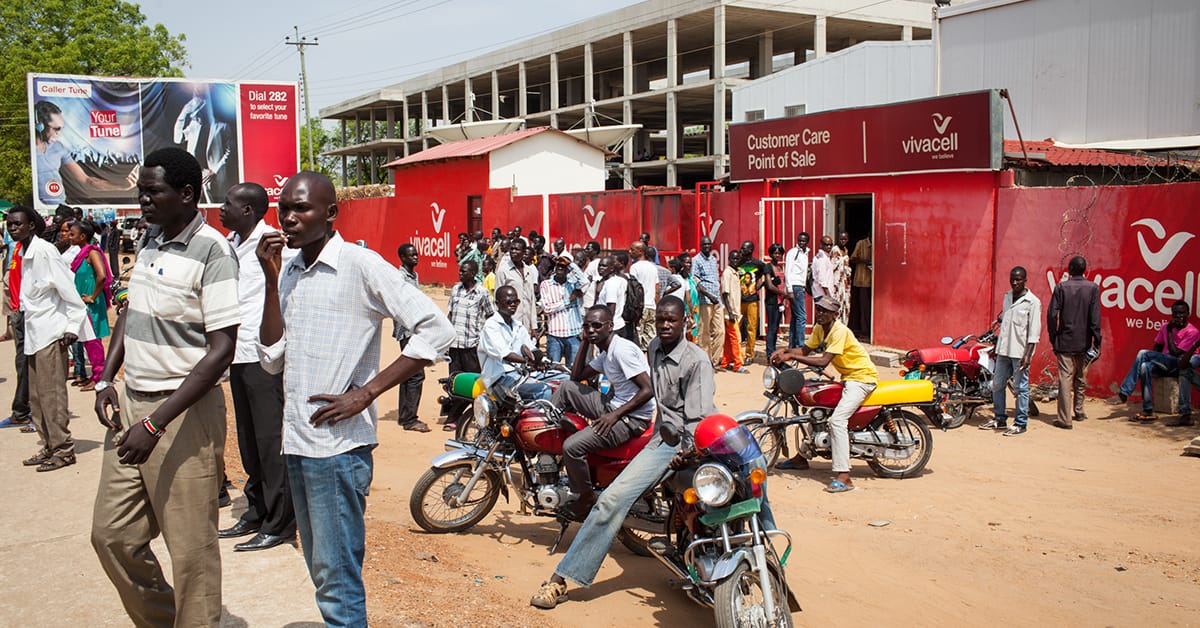South Sudan is rich in oil and land, but also corrupt and unstable.

|
VITAL STATISTICS |
|---|
|
Location: East-Central Africa |
|
Neighbors: Sudan, Ethiopia, Kenya, Uganda, Democratic Republic of the Congo, Central African Republic |
|
Capital city: Juba |
|
Population (2021): 11,439,618 |
|
Official language: English, but many other languages spoken |
|
GDP per capita (2020): $459.80 |
|
GDP growth (2020): -6.6% |
|
Inflation (2020): 29.7% |
|
Currency: South Sudanese pound |
|
Investment promotion agency: State Department (“Ministry of Investment”) |
|
Investment incentives available: Generous capital allowances; some tax exemptions and concessions on machinery, equipment, capital and net profits; foreign tax credits and other breaks; however, the US State Department notes that actual incentive structure is unclear. |
|
Ease of Doing Business rank (2020): 179 (out of 180) |
|
Corruption Perceptions Index rank (2020): 42 |
|
Political risks: No democratic elections to date. National elections scheduled for 2023, but it is uncertain whether they will take place. |
|
Security risks: Potential for contagion from hostilities in Ethiopia; dispute between Sudan, Egypt and Ethiopia over the Grand Ethiopian Renaissance Dam project; tension between Sudan and South Sudan, with occasional bombing raids; frequent fighting between the army and armed militia groups; interethnic violence; vehicles regularly stopped and searched at many checkpoints and violence has occurred during such encounters; high levels of violent crime; kidnappings; road conditions extremely poor; unsafe for travel, unknown degree of contagion from tumult in Sudan. |
|
PROS |
|---|
|
Strong support from World Bank |
|
CONS |
|---|
|
Reports of extortions |
|
Weak judicial system |
|
Complex business system |
|
Poor infrastructure |
|
Telecommunications unreliable |
|
No fixed telephone lines |
|
No international postal service |
|
Fuel shortages |
|
Sources: Agence France-Presse, Al Jazeera, Associated Press, Government of Canada Global Travel Advisory, International Monetary Fund, The Hill, Peace Policy, Reuters, the Sentry, Sudan Tribune, Transparency International, US State Department, World Bank, World Population Review |
|
For more information, check out Global Finance‘s South Sudan Economic Report data page. |
This month, South Africa is expected to finally embark on a planned $1 billion investment in South Sudan’s oil sector—including a new refinery and pipelines—that had been delayed more than a year by the Covid-19 pandemic. It will be a critical booster shot for a country that holds sub-Saharan Africa’s third-largest reserves—90% untapped, according to the government—yet has seen production fall to less than half what it was a decade ago.
Born in turmoil and shaped on civil war, South Sudan is a challenging investment destination; yet its rich agricultural land and resources that include gold, gum arabic, teak and all-important petroleum still draw interest.
Susan D. Page, who from 2011 to 2015 was the first US ambassador to South Sudan, explains that “there are countries that are very dangerous or unstable and yet lots of companies are there.” She cites the example of Nigeria, where many foreign oil companies operate in unsafe areas. “They have their oil platforms, and they are busy doing what they need to do.”
Oil offers by far the greatest near-term revenue potential; and international investors include China National Petroleum Corporation, Malaysia’s Petronas and India’s Oil and Natural Gas Corp. Unfortunately, the sector is characterized by massive corruption and looting. A report in September from the UN Commission on Human Rights in South Sudan found that more than $73 million had been taken out of state coffers since 2018, with Yasmin Sooka, commission chair, saying the “corruption, embezzlement, bribery and misappropriation of state funds by political elites is merely the tip of the iceberg.” She added that “foreign corporations have…been complicit.”
A separate report titled Oil or Nothing: Dealing with South Sudan’s Bleeding Finances, released in October by the International Crisis Group, echoed the UN findings, adding that recent low oil prices seemed to have provided some incentive for change. Many also believe pressure from multinationals is encouraging the government to clean up the sector. On October 14, President Salva Kiir removed the head of the state oil company, Nile Petroleum.
To be sure, there is more than oil. Coca-Cola has a foothold in this young and landlocked country through its bottling partner United Beverages. The country has rich lands, although it still imports food. “They have virgin agricultural lands and a very big potential for agriculture because of the tropical climate,” explains Corti Paul Lakuma, research fellow at the Economic Policy Research Centre in Uganda.
Radisson Hotel Group is also present. Kenya’s Equity Bank and KCB Bank, and Commercial Bank of Ethiopia, were among the first banks licensed by the Central Bank of South Sudan—alongside several domestic banks.
Achieving a more secure future would require a long list of political, economic, military and social reforms. A strong leader who could pull together the various factions would be a prerequisite. “If a leader emerges who consolidates power, there could be a chance for peace,” Lakuma says.
A secure future would also require a reversal of all or most of the country’s drawbacks, according to Page, who assessed the situation firsthand as former American ambassador. “They don’t follow their constitution,” she says. “There is no rule of law.”



